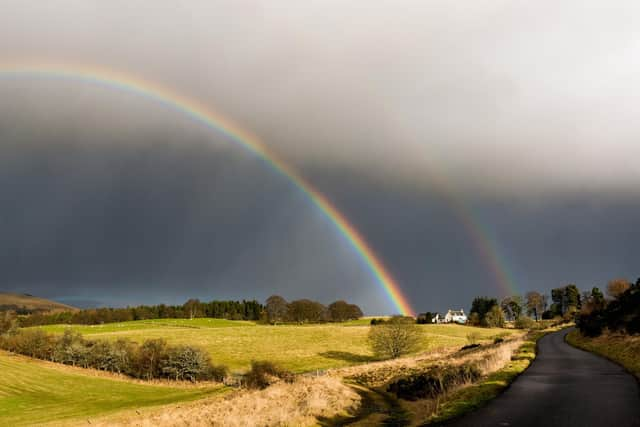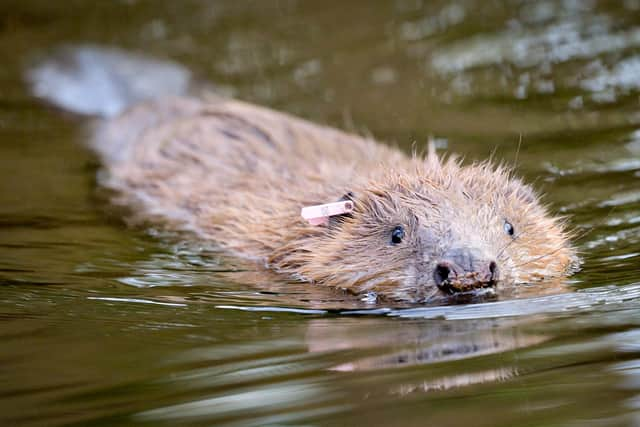World Environment Day: Declaring Scotland a 'Rewilding Nation' ahead of United Nations Cop26 climate summit would create a beacon of hope for the world – Steve Micklewright


The world body is highlighting how we are losing and destroying nature – and so the foundations of our own survival – at an alarming rate. From forests to peatlands to coasts, the situation is grim.
Here in Scotland, the government has signed up to bold action to tackle the nature and climate crises over the next decade through the Edinburgh Declaration. But we are one of the most nature-depleted countries in the world.
Advertisement
Hide AdAdvertisement
Hide AdOnly 1.5 per cent of our land is national nature reserves. Just four per cent is native woodland. A quarter of our land no longer supports the nature-rich forests, peatlands and river systems it should. Red squirrels, wild cats, capercaillie and great yellow bumblebees are at risk or declining. Seabirds are feeding their chicks plastic waste. Rural landscapes support fewer people than previously.
This is where rewilding – the large-scale restoration of nature – offers hope in what so often seems a hopeless world. As the UN says, it’s time to be bold not timid – and to be active not anxious.
By working with nature instead of against it, rewilding can restore life to our hills, glens, rivers and seas. It can offer new opportunities to local communities and economies. It can help solve other problems we have created – including climate breakdown, flooding, pollution, and degraded soils.
That’s why the Scottish Rewilding Alliance – a coalition of over 20 environmental organisations – is calling on the Scottish government to declare Scotland the world’s first Rewilding Nation.


The campaign calls for the rewilding of 30 per cent of Scotland’s land and sea within a decade. This involves growing more wild native forests, genuinely protecting large areas of sea, and restoring peatlands, moorlands, grasslands and wetlands.
This can be achieved with no loss of productive farmland, while offering landowners and farmers fresh diversification opportunities for managing marginal land in a more nature-friendly way.
Habitat restoration should be accompanied by appropriate reintroduction of keystone species, including rehoming beavers beyond their current limited range, and considering a pilot reintroduction for Eurasian lynx where there is appropriate habitat and – crucially – local support and stakeholder buy-in.
Rewilding our towns and cities is also essential, to ensure we all have opportunities to reconnect with nature – vital for our health and well-being, and so important for so many during the pandemic.
Advertisement
Hide AdAdvertisement
Hide AdThe campaign also calls for rewilding to be added as a driver to the Scottish government’s economic strategy, with more investment in natural solutions.
All of this would be popular too. Three-quarters of Scots who expressed an opinion supported it in polling by respected market research organisation Survation.
Meanwhile, practical rewilding and nature restoration action is underway and rapidly increasing.
Scottish members of the new Rewilding Network – which is bringing together landowners, farmers, land managers, community groups and local authorities from across Britain – will soon cover some 200,000 acres of land between them.
These inspiring sites include the Borders Forest Trust’s Wild Heart of Southern Scotland; John Muir Trust’s Glenlude in the Scottish Borders and its land at Knoydart, Li and Coire Dhorrcail; the Bamff Estate and the Bunloit Estate in the Highlands; Creag Meagaidh and Mar Lodge in the Cairngorms; and the Trees for Life Dundreggan Estate near Loch Ness.
Complementing this network of major landscape-scale sites, the Northwoods Rewilding Network – recently launched by charity Scotland: The Big Picture – is enabling more smaller landholdings of 50 to 1,000 acres to play a bigger role in restoring and connecting rich habitats full of life.
Northwoods is filling in the gaps in local areas and joining together a tapestry of smaller nature recovery sites and wildlife corridors. It already includes 12 initial land partners – farms, crofts, small estates and community-owned land – covering 3,500 acres between them. The project hopes to expand to at least 10,000 acres within two years.
Signs of hope are emerging all over. In Dumfries and Galloway, the South of Scotland’s largest community buyout was recently legally completed following one of the most ambitious community fundraising campaigns ever. After raising £3.8 million, the Langholm Initiative charity successfully purchased 5,200 acres of Langholm Moor from Buccleuch, to create the vast new Tarras Valley Nature Reserve.
Advertisement
Hide AdAdvertisement
Hide AdThe Community of Arran Seabed Trust (Coast) marine recovery in Lamlash Bay on Arran shows what communities can achieve in terms of establishing vital no-take zones and protected areas – and how incentives for lower-impact fisheries around our coastline would help degraded habitats and fish populations recover, and regenerate our harbours and coastal towns.
So hope is there, and it’s growing. But with the world facing overlapping nature, climate and health crises – all worsened by our broken relationship with the natural world – much more needs to happen, and fast. This means our politicians need to step up.
By declaring Scotland to be a Rewilding Nation ahead of the global Cop26 climate conference in Glasgow later this year, the Scottish government would be showing positive leadership. It would be a world first, as long as someone else doesn’t beat us to it.
This could see Scotland establish itself as a world leader in saving nature and ourselves. Rather than lagging behind, we could be one of the first countries to not only halt biodiversity loss – but to reverse it.
We have the space, political influence and public backing to do this. Rewilding can ensure our landscapes and seascapes – today increasingly silent and sterile – are restored and rich in life again. Scotland can be a beacon of hope, and the opportunity is there if we want to seize it.
Steve Micklewright is chief executive of rewilding charity Trees for Life
A message from the Editor:
Thank you for reading this article. We're more reliant on your support than ever as the shift in consumer habits brought about by coronavirus impacts our advertisers.
If you haven't already, please consider supporting our trusted, fact-checked journalism by taking out a digital subscription.
Comments
Want to join the conversation? Please or to comment on this article.
